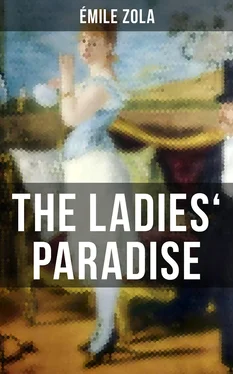“Ah! Paul, old boy,” repeated Mouret.
He was seated near Vallagnosc, on a sofa. And alone in the little drawing-room, very coquettish with its pretty silk hangings, out of hearing of the ladies, and not even seeing them, except through the open door, the two old friends commenced grinning, examining each other’s looks, exchanging slaps on the knees. Their whole youthful career was recalled, the old college at Plassans, with its two courtyards, its damp classrooms, and the dining room in which they had consumed so much cod-fish, and the dormitories where the pillows used to fly from bed to bed as soon as the monitor began to snore. Paul, belonging to an old parliamentary family, noble, poor, and proud, was a good scholar, always at the top of his class, continually held up as an example by the master, who prophesied for him a brilliant future; whilst Octave remained at the bottom, stuck amongst the dunces, fat and jolly, indulging in all sorts of pleasures outside. Notwithstanding the difference in their characters, a fast friendship had rendered them inseparable, until their final examinations, which they passed, the one with honors, the other in a passable manner after two vexatious trials. Then they went out into the world, and had now met again, after ten years, already changed and looking older.
“Well,” said Mouret, “what’s become of you?”
“Nothing at all,” replied the other.
Vallagnosc, in the joy of their meeting, retained his tired and disenchanted air; and as his friend, astonished, insisted, saying: “But you must do something. What do you do?”
“Nothing,” replied he.
Octave commenced to laugh. Nothing! that wasn’t enough. Little by little he succeeded in drawing Paul out to tell his story. It was the usual story of penniless younger sons, who think themselves obliged by their birth to choose a liberal profession, burying themselves in a sort of vain mediocrity, happy to escape starvation, notwithstanding their numerous degrees. He had studied law by a sort of family tradition; and had since remained a burden on his widowed mother, who even then hardly knew how to dispose of her two daughters. Having at last got quite ashamed, he left the three women to vegetate on the remnants of their fortune, and accepted an appointment in the Ministry of the Interior, where he buried himself like a mole in its hole.
“What do you get there?” resumed Mouret.
“Three thousand francs.”
“But that’s pitiful pay! Ah! old man, I’m really sorry for you. What! a clever fellow like you, who floored all of us! And they only give you three thousand francs a year, after having already ground you down for five years! No, it isn’t right!” He interrupted himself, and returned to his own doings. “As for me, I made them a humble bow. You know what I’m doing?”
“Yes,” said Vallagnosc, “I heard you were in business. You’ve got that big place in the Place Gaillon, haven’t you?”
“That’s it. Counter-jumper, my boy!”
Mouret raised his head, again slapped him on the knee, and repeated, with the solid gaiety of a fellow who did not blush for the trade by which he was making his fortune:
“Counter-jumper, and no mistake! You remember, no doubt, I didn’t bite much at their machines, although at heart I never thought myself duller than the others. When I took my degree, just to please the family, I could have become a barrister or a doctor quite as easily as any of my school-fellows, but those trades frightened me. I saw so many who were starving at them that I just threw them over without the least regret, and pitched head-first into business.”
Vallognosc smiled with an awkward air, and ultimately said: “It’s very certain your degree can’t be much good to you for selling calico.”
“Well!” replied Mouret, joyously, “all I ask is, that it shall not stand in my way, and you know, when one has been stupid enough to burden one’s self with it, it is difficult to get rid of it. One goes at a tortoise’s pace through life, whilst those who are bare-footed run like madmen.” Then, noticing that his friend seemed troubled, he took his hand in his, and continued: “Come, come, I don’t want to hurt your feelings, but confess that your degrees have not satisfied any of your wants. Do you know that my manager in the silk department will draw more than twelve thousand francs this year. Just so! a fellow of very clear intelligence, whose knowledge is confined to spelling, and the first four rules. The ordinary salesmen in my place make from three to four thousand francs a year, more than you can earn yourself; and their education was not so expensive as yours, nor were they launched into the world wjth a written promise to conquer it. Of course, it is not everything to make money; but between the poor devils possessed of a smattering of science who now block up the liberal professions, without earning enough to keep themselves from starving, and the practical fellows armed for life’s struggle, knowing every branch of their trade, by Jove! I don’t hesitate a moment, I’m for the latter against the former, I think they thoroughly understand the age they live in!”
His voice had become impassioned. Henriette, who was pouring out the tea, turned her head. When he caught her smile, at the further end of the large drawing-room, and saw the other ladies were listening, he was the first to make merry over his own big phrases.
“In short, old man, every counter-jumper who commences, has, at the present day, a chance of becoming a millionaire.”
Vallagnosc threw himself back on the sofa indolently, half-closing his eyes in a fatigued and disdainful attitude, in which a suspicion of affectation was added to his real hereditary exhaustion.
“Bah!” murmured he, “life isn’t worth all that trouble. There is nothing worth living for.” And as Mouret, shocked, looked at him with an air of surprise, he added: “Everything happens and nothing happens; one may as well stay with one’s arms folded.”
He then explained his pessimism—the mediocrities and the abortions of existence. For a time he had thought of literature, but his intercourse with certain poets had filled him with universal despair. He always arrived at the conclusion that all effort was useless, every hour equally weary and empty, and the world incurably stupid and dull. All enjoyment was a failure, and there was no pleasure in wrong-doing even.
“Just tell me, do you enjoy life yourself?” asked he at last.
Mouret was now in a state of astonished indignation, and exclaimed: “What? Do I enjoy myself? What are you talking about? Why, of course I do, my boy, and even when things give way, for then I am furious at hearing them cracking. I am a passionate fellow myself, and don’t take life quietly; that’s what interests me in it perhaps.” He glanced towards the drawing-room, and lowered his voice. “Oh! there are some women who’ve bothered me awfully, I must confess. But when I’ve got hold of one, I keep her. She doesn’t always escape me, and then I take my share, I assure you. But it is not so much the women, for to speak truly, I don’t care a hang for them; it’s the wish to act—to create, in short. You have an idea; you fight for it, you hammer it into people’s heads, and you see it grow and triumph. Ah! yes, my boy, I enjoy life!”
All the joy of action, all the gaiety of existence, resounded in these words. He repeated that he went with the times. Really, a man must be badly constituted, have his brain and limbs out of order, to refuse to work in an age of such vast undertakings, when the entire century was pressing forward with giant strides. And he laughed at the despairing ones, the disgusted ones, the pessimists, all those weak, sickly members of our budding sciences, who assumed the weeping airs of poets, or the minting ways of skeptics, amidst the immense activity of the present day. A fine part to play, proper and intelligent, that of yawning before other people’s labor!
Читать дальше












